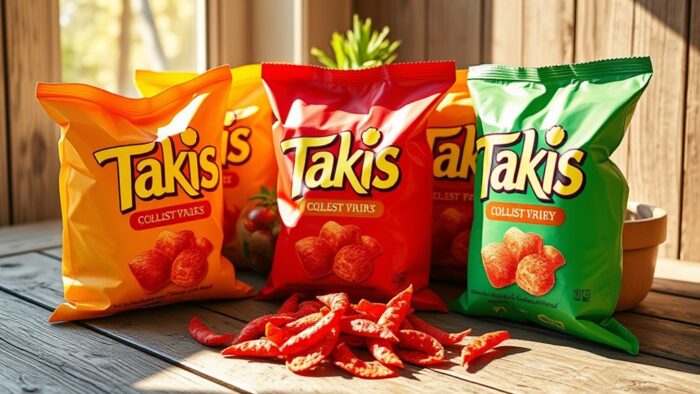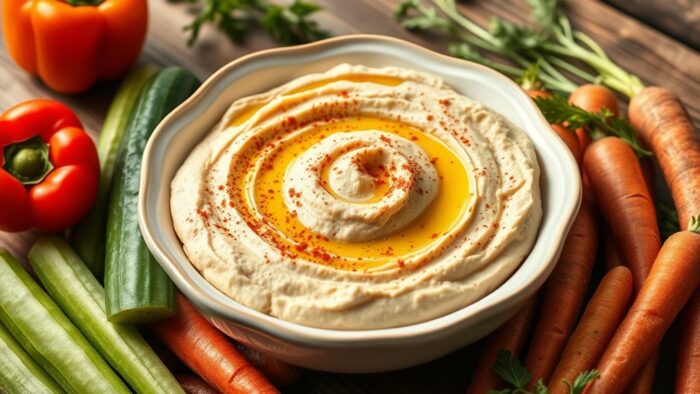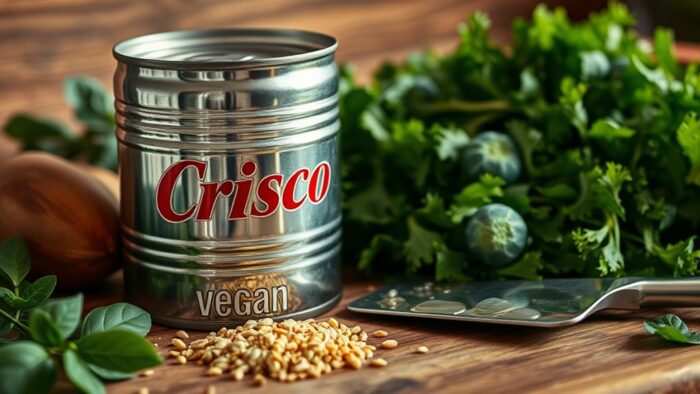Is Imitation Crab Meat Vegan?
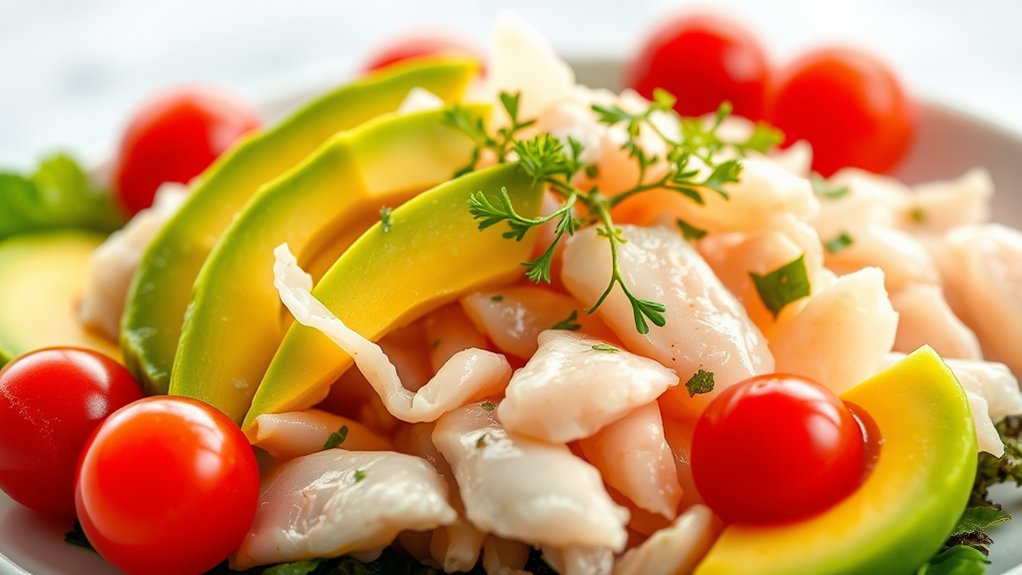
Are you curious about whether imitation crab meat fits into a vegan lifestyle? It’s a common question for those analyzing plant-based diets or looking for seafood alternatives. Understanding the ingredients in imitation crab meat can help you make informed choices about what you eat. This topic matters because it involves not just dietary preferences but also health and nutrition. While imitation crab meat is often seen as a seafood substitute, there’s more to the story. Let’s dive into what makes this food item tick and look into some plant-based options that might be a better fit for your plate.
Understanding Imitation Crab Meat
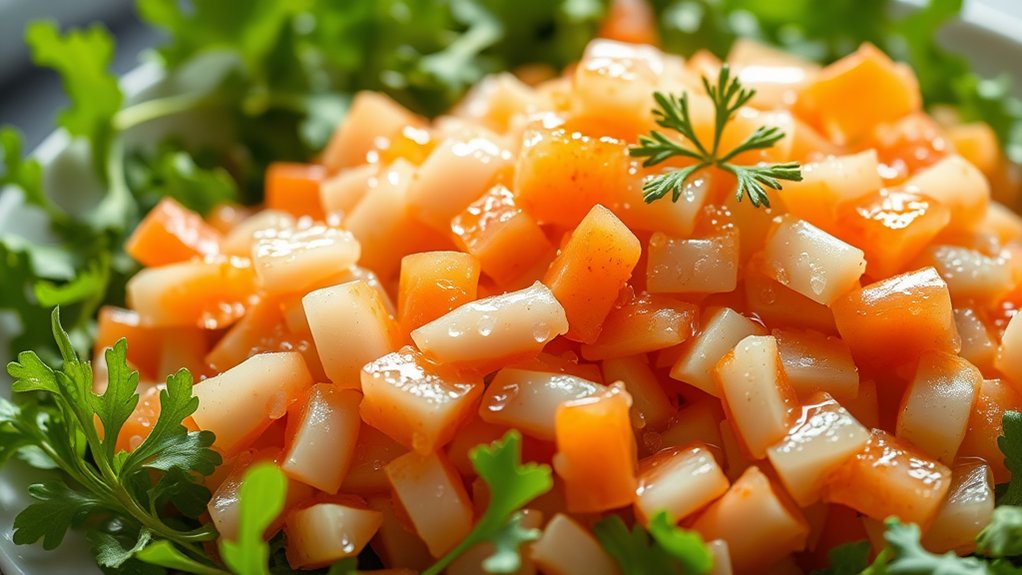
Imitation crab meat, commonly known as kanikama, is a seafood product created to replicate the taste and texture of real crab. It’s primarily made from surimi, which is a processed fish paste sourced from Alaska pollock. The production process involves grinding the fish into a paste, adding flavors, and then shaping it to resemble crab meat.
While imitation crab meat is popular in various dishes such as sushi rolls and salads due to its seafood-like flavor and versatility, it’s important to note that it isn’t suitable for those following a plant-based diet. The presence of fish and potential animal byproducts means that imitation crab meat isn’t compatible with a vegan lifestyle.
For those considering vegetarian or vegan options, it’s essential to be cautious, as imitation crab meat contains animal-derived ingredients.
If you’re looking into alternatives, there are plant-based seafood substitutes available that can provide a similar experience without using fish. Understanding the ingredients and production processes of imitation crab meat can help you make informed choices that align with your dietary preferences.
The Ingredients Behind Imitation Crab
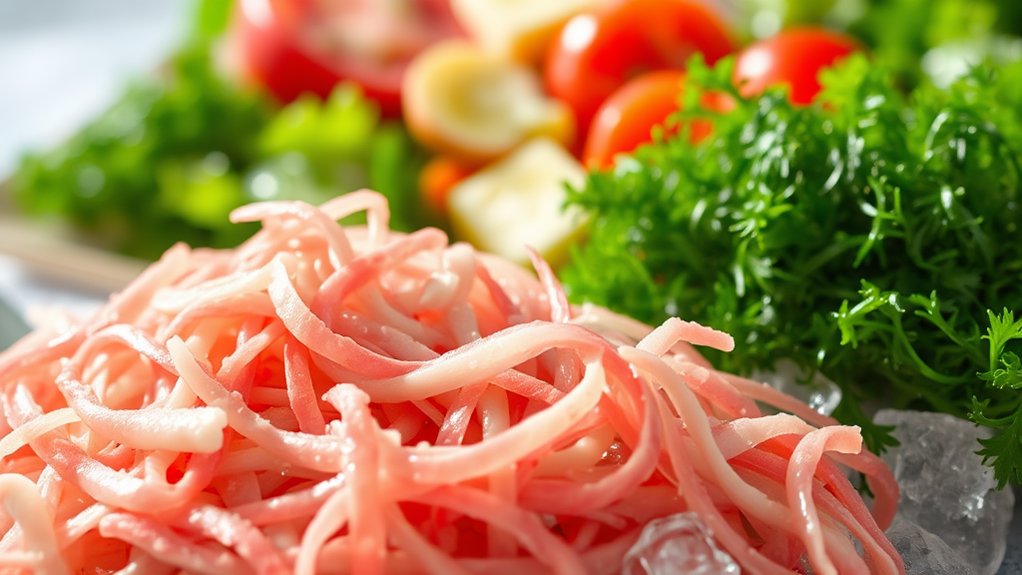
Imitation crab is a popular seafood alternative that many enjoy for its taste and convenience. However, understanding the ingredients behind imitation crab can help consumers make informed choices.
The primary component of imitation crab is surimi, which is a processed paste made from ground white-fleshed fish, most commonly Alaska pollock. This base ingredient is often combined with fillers and starches to improve texture and flavor. In some cases, manufacturers also use egg whites as a binder.
To create a more visually appealing product, artificial coloring, like orange dye, is added to imitate the look of real crab meat. It’s important to note that some brands of imitation crab may also include added sugars and monosodium glutamate (MSG), which can detract from the nutritional benefits found in genuine crab.
Additionally, because imitation crab is derived from fish, it does contain animal byproducts, making it unsuitable for vegans and vegetarians.
Therefore, when considering imitation crab as a food option, it’s essential to closely examine the ingredient list to understand what you’re consuming. By being informed about the components of imitation crab, you can make better choices that align with your dietary preferences and health goals.
Nutritional Profile of Imitation Crab
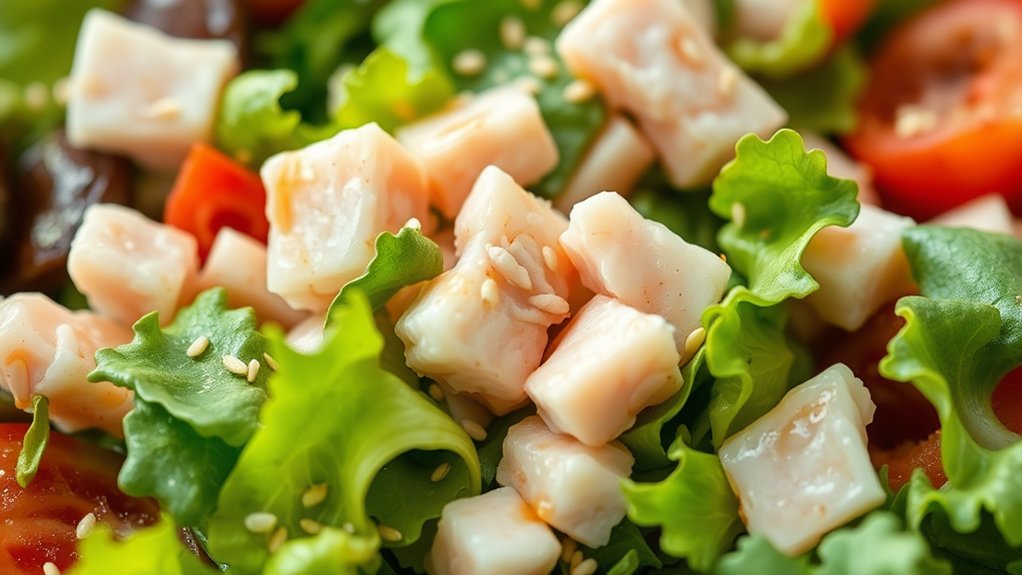
When looking at the nutritional profile of imitation crab, you’ll find it contains approximately 6 grams of protein per serving. This is less than what you’d get from real crab.
It’s worth noting that imitation crab tends to lack some essential vitamins and minerals, which can be a downside. Plus, some brands incorporate preservatives and sugar, which mightn’t align with everyone’s health goals.
Now that we’ve covered imitation crab, let’s analyze other seafood options that may offer better nutritional benefits.
Protein Content Comparison
Imitation crab, which contains about 6 grams of protein per serving, is often compared to various vegan alternatives that can provide similar or even higher protein levels. For example, tofu and jackfruit, depending on their preparation, can match or exceed the protein content of imitation crab.
The protein in imitation crab comes from surimi, a fish product, while vegan options rely on plant-based sources that can also be higher in fiber and essential nutrients.
It’s worth noting that imitation crab contributes approximately 9% of your daily magnesium intake. However, many plant-based proteins not only offer protein but also come packed with essential vitamins and minerals.
Due to the high level of processing that imitation crab undergoes, it may lack some of the nutritional benefits found in whole-food plant-based alternatives.
For those looking to boost their protein intake while also considering nutritional quality, analyzing vegan options can be a smart choice. Plant-based proteins can offer a well-rounded nutrient profile that supports overall health.
Nutritional Deficiencies Identified
Imitation crab, often used as a seafood substitute, has several nutritional shortcomings that health-conscious consumers should be aware of. While it does provide around 6 grams of lean protein per serving, this amount is significantly lower than what you’d find in real crab meat, which is a richer source of protein.
When it comes to essential minerals, imitation crab offers only about 9% of the daily recommended intake for magnesium, making it a less reliable source compared to natural seafood options. Additionally, many brands of imitation crab are highly processed and may contain added sugars and monosodium glutamate (MSG), which can further reduce their health benefits.
Another key aspect to consider is the low content of omega-3 fatty acids in imitation crab. These heart-healthy fats are abundant in real crab and are essential for maintaining cardiovascular health.
The presence of fillers and artificial ingredients in imitation crab also raises concerns about its overall nutritional quality.
When evaluating seafood alternatives, it’s important to consider these factors. While imitation crab may be convenient and affordable, understanding its nutritional deficiencies can help you make more informed choices about your diet.
Opting for real crab or other seafood options can provide you with more substantial health benefits.
Additives and Preservatives Impact
Imitation crab is often chosen for its convenience, but it’s important to understand how the additives and preservatives in these products affect their nutritional value. Here are some essential points to consider:
- Processing and Additives: Imitation crab is highly processed and typically contains ingredients such as sugar and monosodium glutamate (MSG). These additives can increase flavor but don’t provide significant nutritional benefits.
- Protein Quality: The main ingredient, surimi, is blended with starch and fillers, which can dilute its protein quality. Additionally, imitation crab lacks essential nutrients like omega-3 fatty acids, which are important for a balanced diet.
- Visual Enhancements: Artificial coloring agents are often used to improve the appearance of imitation crab, making it look more appealing. However, these coloring agents don’t contribute any nutritional value and may complicate its use for those following a vegan diet, as egg whites are often used as binding agents.
Why Imitation Crab Is Not Vegan
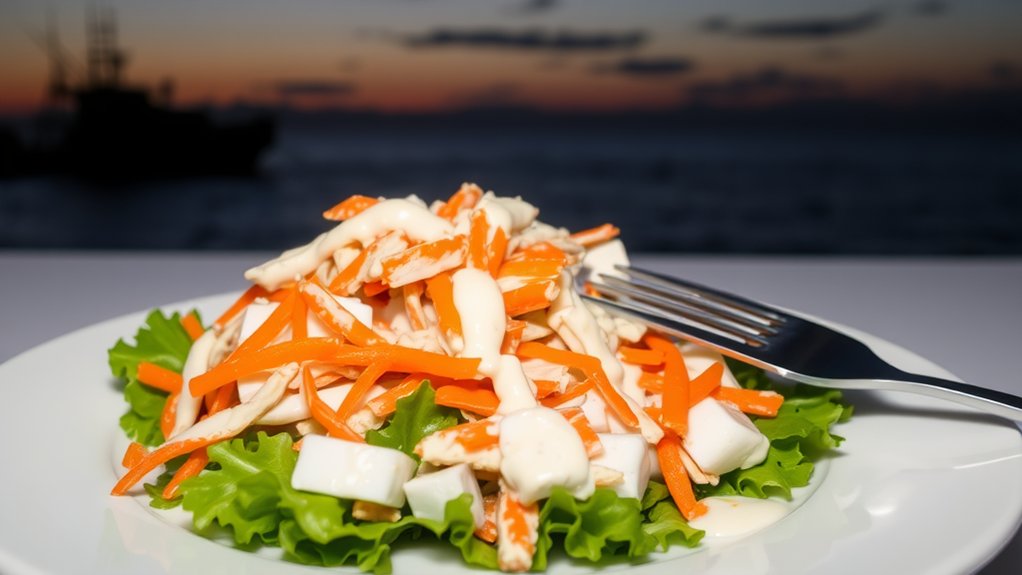
Imitation crab isn’t considered vegan because it primarily contains surimi, which is made from ground fish. This seafood ingredient fundamentally contradicts the principles of a plant-based diet.
In addition to fish, some varieties of imitation crab may also include egg whites, which further disqualifies it from being vegan-friendly.
Although it’s marketed as a crab substitute, imitation crab still contains fish-derived components that many vegans choose to avoid. The fishing industry involved in sourcing surimi often faces criticism for its environmental and ethical practices, which resonates with the values of many individuals following a vegan lifestyle.
Moreover, imitation crab is a highly processed food that typically includes artificial additives and flavorings.
For those committed to cooking with whole, plant-based ingredients, this makes imitation crab unsuitable. Understanding these aspects can help you make informed choices about your food options and align them more closely with your dietary preferences.
Popular Vegan Alternatives to Imitation Crab
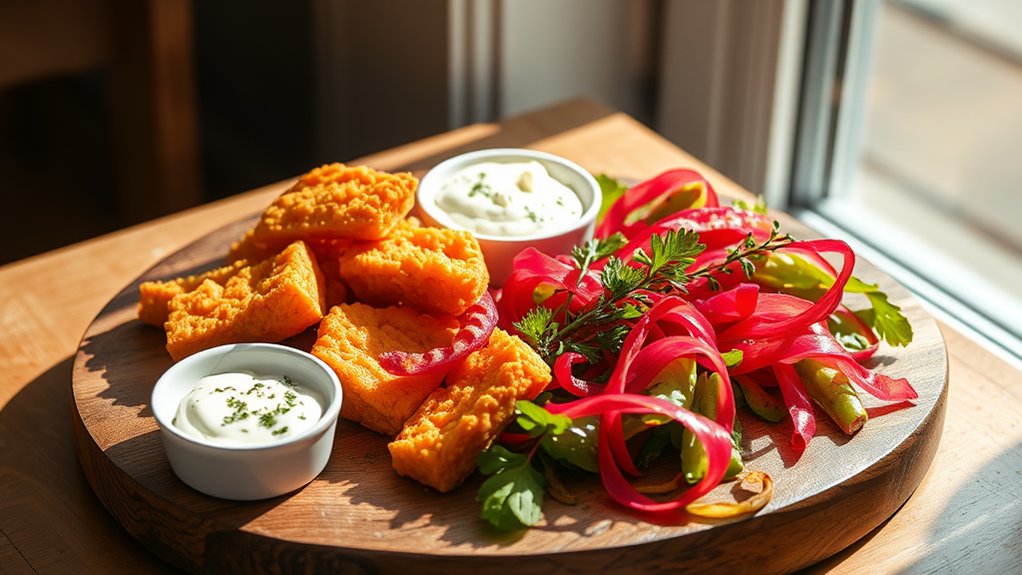
For those interested in plant-based eating, there are several effective alternatives to imitation crab that can be used in a variety of dishes. Here are three popular vegan substitutes:
- Hearts of Palm: This ingredient has a mild flavor and a pleasing crunchy texture, making it an excellent choice for salads and crab cakes. Hearts of palm can be easily chopped or shredded to mimic the appearance of crab meat in your recipes.
- Jackfruit: This versatile fruit is particularly useful in vegan cooking due to its ability to shred easily, resembling the texture of crab meat. Jackfruit works well in dishes like vegan crab cakes and can absorb flavors from seasonings and sauces, boosting the overall taste.
- Lion’s Mane Mushrooms: These mushrooms are known for their unique texture and juicy consistency. They can be sautéed or used in pasta dishes, providing a satisfying bite that can replace crab meat in various recipes.
Another option to consider is artichoke hearts, which can add a soft, juicy element to dips and soups.
Incorporating these ingredients into your cooking can help you achieve a satisfying alternative to imitation crab while offering a variety of flavors and textures. Each of these substitutes not only caters to those following a vegan diet but also makes certain that you won’t miss out on the enjoyment of dishes typically made with crab.
Delicious Vegan Crab Recipes to Try
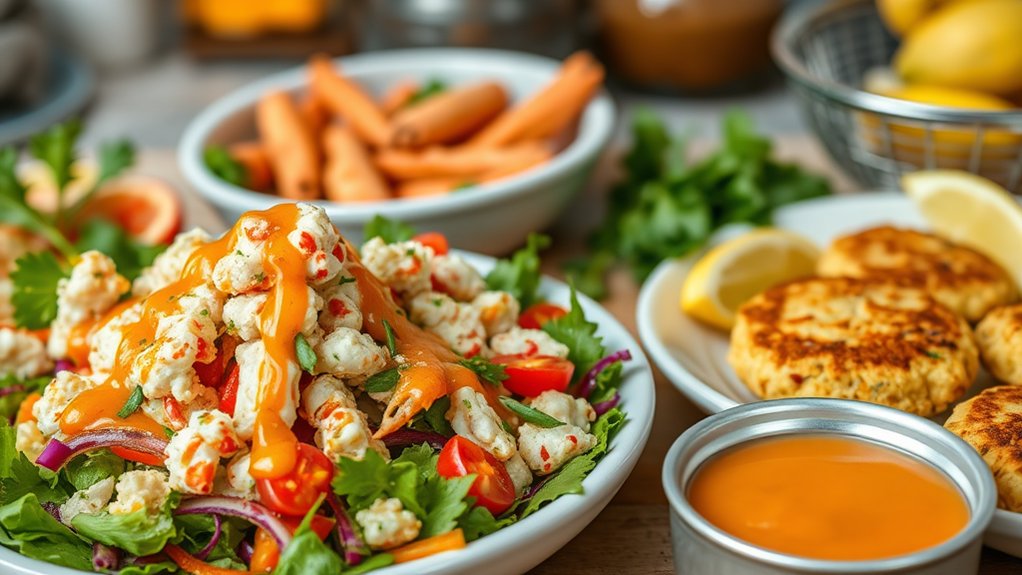
If you’re interested in looking into tasty vegan crab recipes, jackfruit crab salad is a fantastic choice that closely resembles the texture of real crab.
Another great option is vegan crab cakes made with hearts of palm, which offer a burst of flavor without using any animal products.
You might also want to try seafoodless sushi rolls that feature these creative ingredients, giving a fresh twist to a familiar dish.
Speaking of innovative recipes, let’s look at some other plant-based alternatives that can improve your meals.
Jackfruit Crab Salad
Jackfruit crab salad is a fantastic vegan alternative to traditional crab dishes. This recipe uses young green jackfruit, which effectively mimics the texture of crab meat, providing a satisfying experience without any animal products.
The addition of kelp granules increases the flavor profile, giving it a distinctly oceanic taste that’s reminiscent of seafood. Furthermore, jackfruit is rich in vitamins and minerals, making it a healthier option compared to conventional imitation crab.
To make the most of your jackfruit crab salad, consider these practical serving suggestions:
- Sandwich: Use the salad as a filling in a sandwich for a nutritious and hearty lunch option.
- Appetizer: Spoon the salad onto crackers for an easy and delicious appetizer that can impress your guests.
- Standalone Dish: Enjoy it on its own, garnished with your favorite toppings for a quick meal.
This versatile recipe allows for customization based on your preferences. You can add various ingredients like diced celery, red onion, or even a squeeze of lemon juice to boost the flavors further.
Vegan Crab Cakes
Vegan crab cakes provide a flavorful alternative for those looking to enjoy seafood flavors while adhering to a plant-based diet. By incorporating ingredients like jackfruit and hearts of palm, you can replicate the texture of crab meat effectively.
To improve the seafood-like taste, seasoning is crucial; Old Bay seasoning is a popular choice among many cooks for its authentic flavor profile.
To make certain your vegan crab cakes maintain their shape and consistency, binding agents such as chickpea flour or breadcrumbs are essential. These ingredients help hold everything together, resulting in a satisfying texture.
The beauty of vegan crab cakes lies in their versatility. You can easily modify the recipe with various spices, herbs, and additional ingredients to suit your taste preferences. This adaptability makes vegan crab cakes a fantastic option for any meal, whether as an appetizer or a main dish.
By looking into different flavor combinations, you can create a dish that not only meets your dietary choices but also pleases your palate.
Seafoodless Sushi Rolls
Seafoodless sushi rolls present an exciting opportunity for those looking for flavorful plant-based alternatives to traditional crab sushi. By using ingredients like hearts of palm or jackfruit, you can effectively replicate the texture and flavor typically associated with crab.
Here are some key components to consider when crafting your seafoodless sushi rolls:
- Kelp Granules: Incorporating kelp granules can add a subtle hint of ocean flavor to your rolls, increasing the overall taste without the use of seafood.
- Plant-Based Cream Cheese or Avocado: Using plant-based cream cheese or avocado introduces a creamy texture that pairs well with the vegan crab substitutes, making the dish more satisfying.
- Old Bay Seasoning: This classic spice blend is a great addition, as it mimics the flavors commonly found in crab dishes, allowing you to achieve that authentic taste without the seafood.
There are many recipes available online for seafoodless sushi rolls, allowing you to tailor them to your personal preferences.
Feel free to experiment with various ingredients and combinations to find what you enjoy most.
With these tips, you can create delicious and satisfying sushi rolls that fit your dietary choices while still offering a flavorful experience. Enjoy your culinary journey!
Ethical Considerations in Seafood Choices
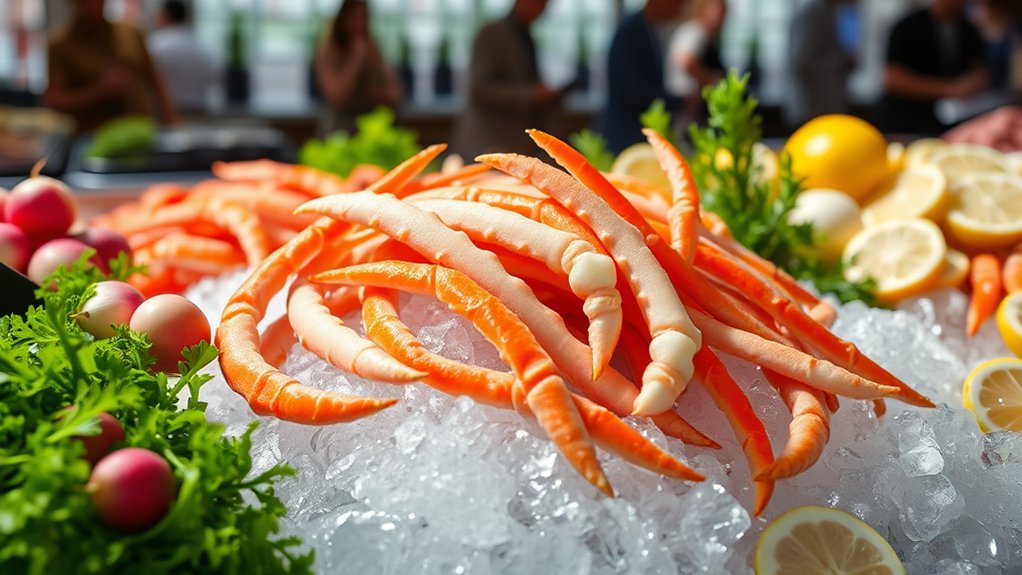
As consumers become more informed about the implications of their food choices, the ethical considerations surrounding seafood consumption have become increasingly important. Research shows that many fish and crabs display complex behaviors, suggesting a level of sentience that raises significant questions about their welfare. This awareness prompts us to think critically about the ethical dimensions of our seafood choices.
The fishing industry is often linked to environmental concerns, particularly issues like overfishing and habitat destruction, which undermine the sustainability of marine ecosystems. By choosing plant-based alternatives, such as vegan crab substitutes, you can actively support animal welfare while also reducing the demand for practices that harm the environment.
Moreover, it’s essential to recognize that ethical considerations extend beyond marine life. The fishing industry is also associated with human rights violations, including labor exploitation and unsafe working conditions. Understanding these issues can empower you to make more compassionate and informed seafood choices.
Final Thoughts on Imitation Crab and Veganism
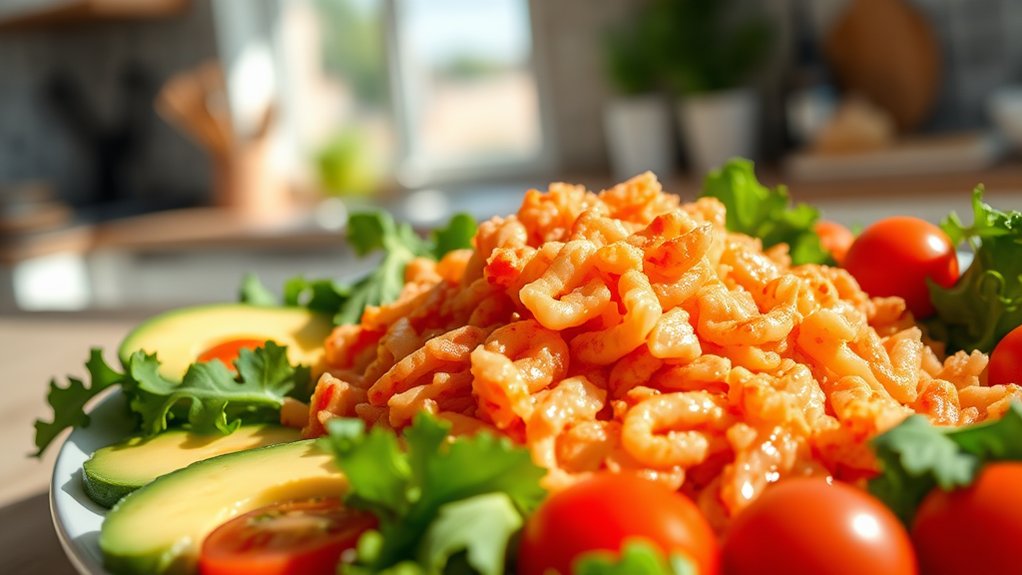
Imitation crab can be an appealing option for those looking for a seafood alternative, but it poses challenges for individuals committed to a vegan lifestyle. The primary ingredient, surimi, is made from ground fish, and many varieties of imitation crab also include egg whites, rendering them unsuitable for vegans.
If you’re analyzing options that align with vegan principles, consider the following points:
- Imitation Crab and Its Ingredients: Imitation crab isn’t a genuine substitute for crab because it contains animal-derived ingredients. This makes it incompatible with a vegan diet, which avoids all animal products.
- Vegan Alternatives: There are several plant-based alternatives that provide a similar texture and flavor to seafood without using animal products. Options like jackfruit, hearts of palm, and tofu are popular choices among vegans. These ingredients can be seasoned and prepared to create dishes that mimic the taste of seafood while remaining entirely plant-based.
- Ethical Eating: A key aspect of veganism is ethical eating, which emphasizes being mindful of food sourcing and processing. Opting for plant-based foods not only supports animal welfare but also encourages sustainable practices that benefit the environment.
